Search the Special Collections and Archives Portal
Search Results


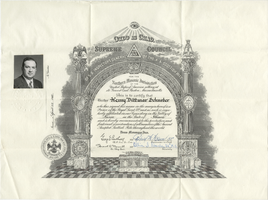
Masonic certificate with inset portrait of Henry Schuster, 1960
Date
Archival Collection
Description
Certificate of membership for Henry Dittmar Schuster in the Scottish Rite, Northern Masonic Jurisdiction.
Mixed Content
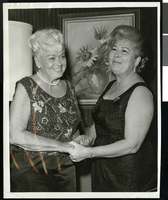
Photograph of Grace Hayes and Bess Rosenberg, Las Vegas (Nev.), December 1965
Date
Archival Collection
Description
Grace Hayes, left, and Bess Rosenberg, right, at a Christmas event in Las Vegas, Nevada. Handwritten description provided on back of image: "1965 Bess Rosenberg; Grace Hayes; Xmas - Las Vegas Nevada; For - crippled children - I came back to the stage - scared to-death. They gave me a standing ovation what a joy/what a ham - but it was a good feeling after being in wheel chair almost nine years - So grateful to God almighty I am walking and I have you "all" my blessed children how lucky can one person be? God bless you this Holy Christmas. Bring you peace - "Kay" "Bop" (sp?)."
Image
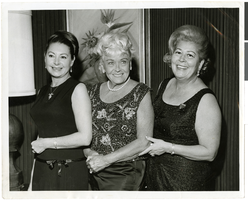
Photograph of Grace Hayes and Bess Rosenberg, Las Vegas (Nev.), December 1965
Date
Archival Collection
Description
From left to right: an unidentified woman, Grace Hayes, and Bess Rosenberg at a Christmas event in Las Vegas, Nevada. Handwritten description provided on back of image: "Xmas at Las Vegas 1965. Big Bess - Grace Hayes - do not know name of other lady but connected with Variety Club. They "all" work like beavers for handicapped children. Wonderful organization Variety Club. I never saw women work this hard - big job too much book keeping and begging for help, at times demanding more or less - they have no fear, for its all for the love of God, charity - Kay "Pop" (sp?) Keep these pictures please."
Image

Transcript of interview with Michael S. Mack by Claytee White, May 21, 2009
Date
Archival Collection
Description
During this interview, Michael Mack visualizes his childhood memories of the later 1930s, when Las Vegas was a small, but steadily growing, desert town. As he says, "The desert was our backyard." The Strip hotels like the last Frontier and the Flamingo pop into the stories, but it was basically an innocent time. He attended John S. Park Elementary when classrooms were temporary buildings from the local Air Force base and the neighborhood was filled with children. He still maintains close friendships from that time. And he also recalls friends from the Westside neighborhood. Michael talks of scouting, riding horses, and watching Helldorado parades.
Michael Mack's first recollection of Las Vegas is as a two-year-old living in a duplex on Bonneville Ave. Though the family moved several times, they remained in or near the John S. Park neighborhood. Michael's father was a Polish immigrant who arrived in Boulder City, where he opened a shoe store, in 1932. The building of the Hoover Dam brought opportunities and his father Louis expanded into the salvage business. In time Louis moved the family to Las Vegas, opened a retail clothing store, which eventually sold uniforms, and set up the first local bail bondman office. During this interview, Michael visualizes his childhood memories of the later 1930s, when Las Vegas was a small, but steadily growing, desert town. As he says, "The desert was our backyard." The Strip hotels like the last Frontier and the Flamingo pop into the stories, but it was basically an innocent time. He attended John S. Park Elementary when classrooms were temporary buildings from the local Air Force base and the neighborhood was filled with children. He still maintains close friendships from that time. And he also recalls friends from the Westside neighborhood. Michael talks of scouting, riding horses, and watching Helldorado parades. Though the Macks were a Jewish family, Michael's mother always brought the Christmas tree to school. It was a period when people memorized each other's 3-digit phone numbers, went to movies for 14 cents, and there was a ranch for people to stay while getting divorced. Halloween Trick-or-treaters in the John S. Park neighborhood might get a tasty cupcake or a shiny dime. Michael has a plethora of stories about innocent mischief and the unique experiences of a boy growing up in Las Vegas.
Text
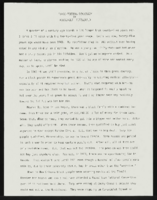
"Force-Feeding Democracy": article draft by Roosevelt Fitzgerald
Date
Archival Collection
Description
From the Roosevelt Fitzgerald Professional Papers (MS-01082) -- Drafts for the Las Vegas Sentinel Voice file. On the 25th Anniversary of 1963 March on Washington.
Text
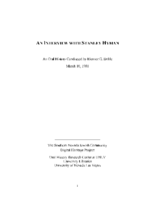
Transcript of interview with Stanley Hyman by Eleanor Doble, March 10, 1981
Date
Archival Collection
Description
Interview with Stanley Hyman by Eleanor Doble on March 10, 1981. In this interview, Hyman discusses his job as a district manager for Farmers Insurance group, which brought him to Reno, Nevada in the 1940s, then to Las Vegas in 1951. He talks about the population growth of Las Vegas, and comments that the infrastructure of the city did not improve with the population growth. He also talks about some local disasters, the economy, entertainment, and the convention business in the area. He speaks briefly about recreation at Lake Mead and Mount Charleston, and atomic tests. The interviewer asks about women in leadership positions in hotels and in the insurance business.
Text
Benedict Family Papers
Identifier
Abstract
The Benedict Family Papers materials date from roughly 1905-1998 and are comprised of correspondence and letters (1969-1971) written to Howard Hughes by the public. The collection also contains correspondence written to Robert Maheu, former chief executive of Nevada operations for Howard Hughes. The collection also includes a variety of casino and gambling related product catalogs, gaming guides for Las Vegas casinos, and of research papers and reports primarily relating to sports betting and cheating.
Archival Collection

